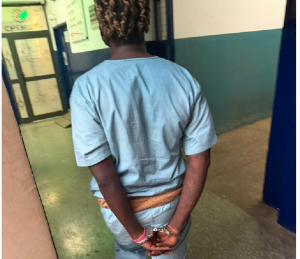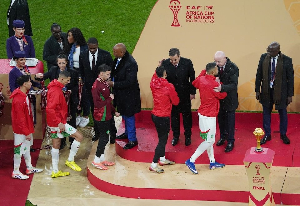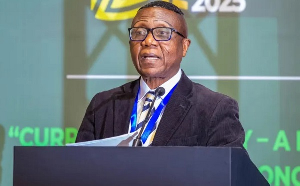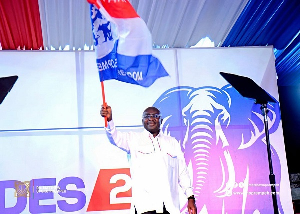Opinions of Monday, 1 September 2014
Columnist: Ata, Kofi
Is Election Petition SC Verdict of Dubious Value?
By Kofi Ata, Cambridge, UK August 30, 2014
Constitutional Law Professor Kwasi Prempeh of Seton Hall University Law School in the US is reported to have described the Supreme Court’s verdict on the 2012 election petition as being of “dubious value”. Addressing a forum organised by policy Think Tank, IMANI Ghana on Friday August 29, 2014 to mark the first anniversary of the election petition verdict in Accra, he stated that the “court’s judgment failed to bring clarity or certainty in how our elections must be conducted” (see “Election petition: SC’s verdict was of “dubious value” – Prempeh, Ghanaweb, August 29, 2014). Is Prof Prempeh right to describe the judgement as being of “dubious value” because he disagreed with the Justices or simply because of their failure to give a road map on how future elections must be conducted? In this article, I intend to challenge the position of the learned professor and Constitutional Law expert.
I am not a lawyer, let alone on matters of (Ghanaian) Constitutional Law so I am treading in dangerous waters by attempting to challenge the expert, though I am confident that my knowledge in Human Rights Law and experience of the interpreting and applying law in general would shield me from making a fool of myself in challenging the professor.
First, the Prof is wrong because there was no requirement on the Justices to clarify or bring certainty in how future elections must be conducted. Moreover, that was part of the reliefs the petitioners sought from the court. The Justices could have but the fact that they decided not to do so does not necessarily make their verdict of “dubious value”.
Would Prof Prempeh hold such views had the verdict been in favour of the petitioners and without a recommendation or directives on the conduct of future election? It’s difficult to answer this question but to answer it objectively, it would be helpful to analyse the minority Justices who annulled votes but did grant any of the reliefs sought by the petitioners (outright annulment of votes and outright declaration of the first petitioner as the winner) but instead, ordered re-vote. The decisions of the four minority Justices are the strongest evidence of the fairness of the verdict as well as being well grounded in Constitutional Law, so that is where I will concentrate my analysis.
The question the Law professor should answer is, why did the four Justices having found fact that there were electoral malpractices did not annul outright the total number of votes without biometric verification, over-voting and no signatures and declare the first petitioner outright winner? The answer lies in Human Rights Law and not purely Constitutional Law because one cannot do justice by interpreting any laws, especially Constitutional Law without reference to Human Rights Laws or International Human Rights Conventions which are the foundations of most Constitutions and that is where I suspect the learned professor fell short of understanding and appreciating the SC verdict.
In Human Rights Law, the interpretation and application of rights bearing enjoyment by the majority is enhanced for many rather than curtailed for the few. The enjoyment of such rights should be restricted only for the common good and if it is proportional and reasonable. For these reasons the minority Justices were mindful that outright annulment of votes in question and outright declaration of the first petitioner as the winner would have disenfranchised some citizens and denied them the right to vote which is guaranteed by the 1992 Ghanaian Constitution and also an international convention that Ghana is a party to. I strongly believe that, this is one of the reasons why the minority Justices did not opt for outright solutions but instead ordered re-voting in the affected constituencies where they annulled votes.
I am also certain that the learned professor is aware that in law, one could not be punished for the wrongs of another person, unless ‘the one’ directly or indirectly contributed to the commissioning of the acts and omissions of ‘the another’. The four Justices’ refusal to grant the reliefs sought by the petitioners was based on this fundamental principle. In their view, wrongs of voting without biomentric verification, over-voting and the absence of signatures were the acts and omissions of the Electoral Commission, its agents and party representatives. So, why should some innocent voters be punished for the wrongs committed by the above mentioned officials? That is why the minority Justices did not punish those voters by disenfranchising them through outright annulment of their votes and instead reinstated their right to vote by ordering re-vote in the affected areas. This decision is constitutionally sound, proportional and proper.
For the sake of argument let’s accept that the majority five Justices who found nothing wrong with voting without biometric verification, over-voting and the absence of signatures erred in law. Had the five agreed with the minority and also annulled the total votes involved and ordered re-voting in the affected constituencies, what would have been the final verdict? That would have still meant that the first petitioner would not have been declared the outright winner because the unanimous decision would have been re-vote and not outright declaration of the first petitioner as winner.
Knowing very well that that the affected areas were mostly, if not all, in NDC/Mahama strongholds, what would have been the final outcome? That is, would the final result of the 2012 Presidential Election been different? The answer is a big no because I could not fathom how NPP/ Nana Akufo-Addo could have won in the stronghold of NDC/Mahama. It would have been a repeat of what happened in Atiwa in 2008. For this reason, I also tempted to believe that the majority Justices’ were right in law on their decisions. Why?
In the interpretation and application of laws, often the right approach is to pose the question, had the law been followed, would the same or a different outcome have been reached? For example, if a claim of unfair dismissal at Employment Tribunal/Court succeeds, the judges are duty bound to pose and answer the above question, particularly, if the reason/s for the claim and the successful outcome was that the employer did not follow due process (laws, regulations of the state and policies and practices of the employer) in dismissing the employee. If the answer to the question is that had due process being followed, the employee would still have been dismissed, then the judges have the option of either dismissing the claim and criticise the employer for not following due process or uphold the claim but reduce any award (compensation) against the employer but definitely not to order reinstatement. The preferred option will depend on the gravity of the departure of the employer from the due process relative to the graving of the employee’s actions and omissions that led to the dismissal. Whichever option the judges prefer must pass the test for proportionality and reasonableness and that would be legal, though it may appear unfair to the dismissed employer.
I suspect that the majority Justices preferred the first option described above whilst the minority Justices opted for the second one and both are legal (taking into consideration the proportionality and reasonableness test). In fact, I am tempted to conclude that the majority Justices did Ghana and the two main political parties a favour by not subjecting Ghana to another mini second round because the country avoided the tension that such mini second round would have generated. Again, the two parties were saved the cost and the trouble of having to marshal financial, material and human resources to execute a mini second round though I strongly believe that democracy should not be at the expense of such costs.
Since the learned Constitutional Law professor lectures in the US, I believe he is aware of the US Supreme Court verdict on the Al Gore versus George Bush presidential petition in 2000. My question to him is, did he describe that verdict as of being “dubious value”? I ask this question because after the verdict in favour of George Bush it subsequently became clear that not only did Al Gore win the Electoral College Vote but the popular vote as well. If he has not described it as of being “dubious value” then why that of Ghana’s SC?
If comparison of the two Supreme Courts’ verdicts is made, it is obvious that that of the US was more ideological and political than that of Ghana. It is possible that Ghana’s was also partly ideological and political and but the refusal of the minority Justices to grant the reliefs of outright annulment and outright declaration of the first respondent as winner suggests to me that the decision was not ideological and political but legal. Had the verdict been five dismissing outright the three reliefs against four allowing the same outright and declaring the first petitioner the winner, then the decision could have been more of ideology and politics than law.
In conclusion and for the reasons above, I am of the strong view that Prof Kwasi Prempeh is wrong to describe the SC verdict as of being “dubious value”. In fact, the negative words he used to describe the verdict suggest that he is not been objective as an academic but rather being party political. Again, the negative words is implicit of some Ghanaian professionals and academics in the Diaspora, including myself, sometimes wrongly believe that we know better than our colleagues at home.
I accept that Prof Kwasi Prempeh has every right to disagree with the SC verdict and to reject it but to describe it in such negative words smacks of disrespect not only to the nine Justices who sat on the petition but the whole institution of the Supreme Court or perhaps, the Judiciary. Whilst I applaud him for contributing to the development of constitutional democracy and Constitutional in Ghana Law by going to Ghana to share his expertise, those of us outside Ghana should be careful with actions and omissions to avoid weakening, especially, constitutional institutions that we should use our knowledge and experience gained from our host countries to strengthen them and improve the quality of our fellow countrymen and women. We should do constructive and objective criticisms and avoid subjective ones and condemnation.
Kofi Ata, Cambridge, UK
Entertainment













